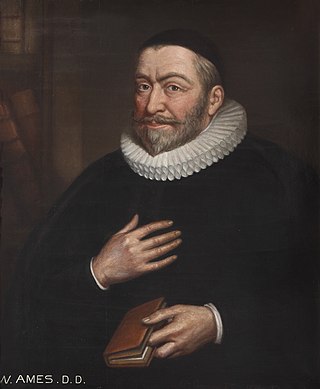Related Research Articles

William Ames was an English Puritan minister, philosopher, and controversialist. He spent much time in the Netherlands, and is noted for his involvement in the controversy between the Calvinists and the Arminians.

Richard Bancroft was an English churchman, Archbishop of Canterbury from 1604 to 1610 and "chief overseer" of the King James Bible.

William Prynne, an English lawyer, voluble author, polemicist and political figure, was a prominent Puritan opponent of church policy under William Laud, Archbishop of Canterbury (1633–1645). His views were presbyterian, but he became known in the 1640s as an Erastian, arguing for overall state control of religious matters.

James Shirley was an English dramatist.
This article contains information about the literary events and publications of 1634.
This article contains information about the literary events and publications of 1632.

In March 1698, Jeremy Collier published his anti-theatre pamphlet, A Short View of the Immorality and Profaneness of the English Stage; in the pamphlet, Collier attacks a number of playwrights: William Wycherley, John Dryden, William Congreve, John Vanbrugh, and Thomas D'Urfey. Collier attacks rather recent, rather popular comedies from the London stage; he accuses the playwrights of profanity, blasphemy, indecency, and undermining public morality through the sympathetic depiction of vice.

John Bastwick (1593–1654) was an English Puritan physician and controversial writer. He was punished for his sedition and this included having his ears removed. We was supported by petitions from his wife Susanna Bestwick.
Stephen Hammerton was a boy player or child actor in English Renaissance theatre, one of the young performers who specialized in female roles in the period before women appeared on the stage. His case illuminates the conditions of boy actors in this era.
The Triumph of Peace was a Caroline era masque, "invented and written" by James Shirley, performed on 3 February 1634 and published the same year. The production was designed by Inigo Jones.
The Bird in a Cage, or The Beauties is a Caroline era comedy written by James Shirley, first published in 1633. The play is notable, even among Shirley's plays, for its lushness — what one critic has called "gay romanticism run mad."
The Shepherd's Paradise was a Caroline era masque, written by Walter Montagu and designed by Inigo Jones. Acted in 1633 by Queen Henrietta Maria and her ladies in waiting, it was noteworthy as the first masque in which the Queen and her ladies filled speaking roles. Along with Tempe Restored (1632), The Shepherd's Paradise marked a step in the evolution in attitudes and practices that led to the acceptance of women onstage during the coming Restoration era.
Events from the 1630s in England.

Thomas Taylor (1576–1632) was an English cleric. A Calvinist, he held strong anti-Catholic views, and his career in the church had a long hiatus. He also attacked separatists, and wrote copiously, with the help of sympathetic patrons. He created a group of like-minded followers.

The trial of William Laud, archbishop of Canterbury, took place in stages in the first half of the 1640s, and resulted in his execution on treason charges. At first an impeachment, the parliamentary legal proceedings became an act of attainder.
Abdias Assheton was an English clergyman. He is noted for his part in the Essex Rebellion; at that time chaplain to Robert Devereux, 2nd Earl of Essex, he induced the imprisoned Essex to make a full confession.

William Laud was a bishop in the Church of England. Appointed Archbishop of Canterbury by Charles I in 1633, Laud was a key advocate of Charles I's religious reforms; he was arrested by Parliament in 1640 and executed towards the end of the First English Civil War in January 1645.
John Herne (c.1593–1649) was an English barrister, involved in high-profile trials of the 1630s and 1640s.
-mastix is a suffix derived from Ancient Greek, and used quite frequently in English literature of the 17th century, to denote a strong opponent or hater of whatever the suffix was attached to. It became common after Thomas Dekker's play Satiromastix of 1602. The word μάστιξ (mastix) translates as whip or scourge.
On September 2, 1642, just after the First English Civil War had begun, the Long Parliament ordered the closure of all London theatres. The order cited the current "times of humiliation" and their incompatibility with "public stage-plays", representative of "lascivious Mirth and Levity". The closure was the culmination of the rising anti-theatrical sentiment among Puritans, and along with William Prynne's Histriomastix (1633), its text was the most notorious attack on theatre in English history.
References
- ↑ W. W. Greg, A Companion to Arber, Oxford, Oxford University Press, 1967; p. 85. See also The Cambridge History of Theatre, Vol. 1, edited by Jane Milling and Peter Thomson, Cambridge, Cambridge University Press, 2004; p. 379.
- ↑ Laura Levine, Men in Women's Clothing: Anti-theatricality and Effeminization, Cambridge, Cambridge University Press, 1994.
- ↑ Barnes, Thomas G. "Hudson, William". Oxford Dictionary of National Biography (online ed.). Oxford University Press. doi:10.1093/ref:odnb/14042.(Subscription or UK public library membership required.)
- ↑ Hart Jr, James S. "Atkyns, Sir Edward". Oxford Dictionary of National Biography (online ed.). Oxford University Press. doi:10.1093/ref:odnb/862.(Subscription or UK public library membership required.)
- ↑ Orr, D. A. "Herne, John". Oxford Dictionary of National Biography (online ed.). Oxford University Press. doi:10.1093/ref:odnb/13085.(Subscription or UK public library membership required.)
- ↑ Kevin Sharpe (1992). The Personal Rule of Charles I . Yale University Press. p. 758. ISBN 0-300-05688-5.
- ↑ Brayley, E. W. (1825). An Enquiry into the Genuineness of Prynne's 'Defence of Stage Plays'. London. p. 13. Retrieved 30 June 2017.
- ↑ Chloridia (1631) and Tempe Restored (1632).
- ↑ Michael Leapman, Inigo: The Troubled Life of Inigo Jones, Architect of the English Renaissance, London, Headline Book Publishing, 2003; pp. 222-3, 298-300.
- ↑ "William Prynne". Britannica. Encyclopedia Britannica. Retrieved 30 June 2017.
- ↑ Sanders, Herbert M. (March–June 1900). "Literature in Captivity". The Book Lover. 1 (3): 319. Retrieved 30 June 2017.
- ↑ Brayley. Enquiry. p. 14.
- ↑ Rees, Emma L. E. (2003). Margaret Cavendish: Gender, Genre, Exile. Manchester: Manchester UP. p. 51, n.91. ISBN 9780719060724 . Retrieved 30 June 2017.